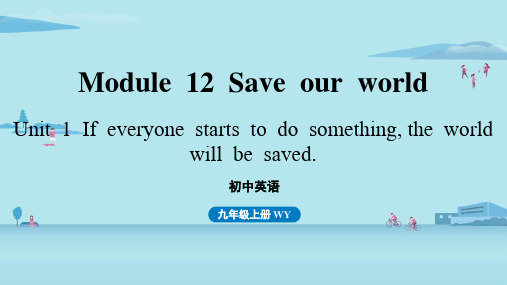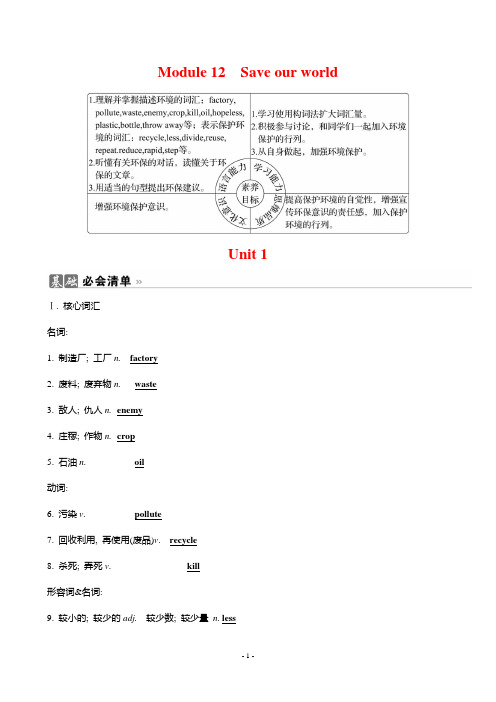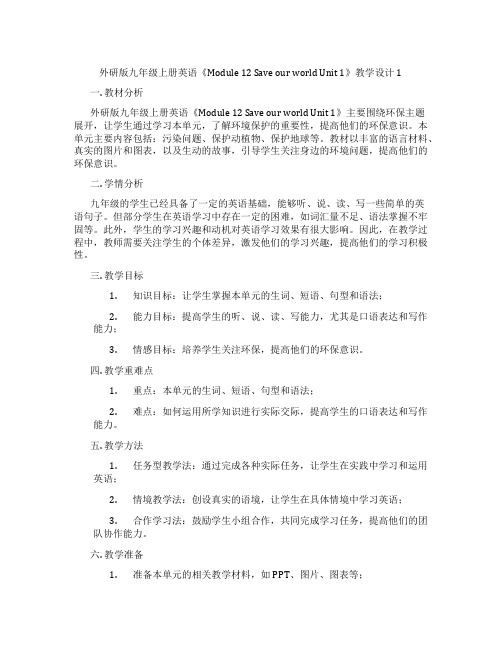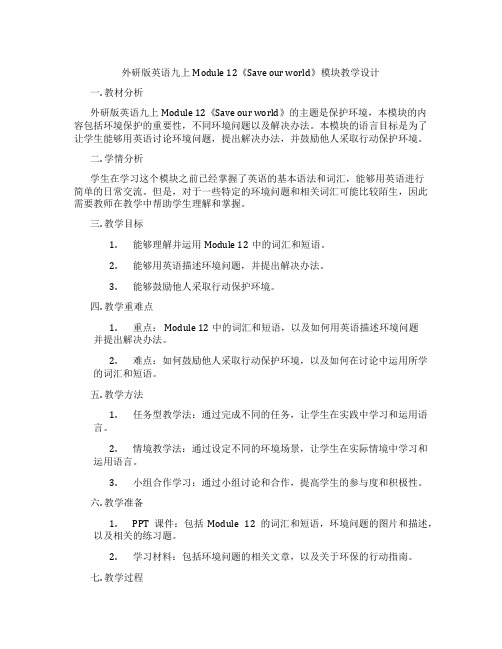外研(新标准)版九年级上Module12Save our world Unit2 Repeat these three words daily reduce,reuse and
外研版九上Module-12--Save-our-world

Module 12 Save our world学习目标1、学会本单元重点单词和重点词组的运用2、语法知识点:前缀、后缀构词法重点知识点’s no use doing sth.做某事是没有用的。
him not to worry.告诉他不要担心没有用。
2、such as 例如,比如(用来列举同类人或物中的几个例子,as后面不可以有逗号)辨析:such as与for example的区别(1) such as一般用来列举同类人或物中的几个例子,插在被列举的例子和前面的名词之间,a s后没有逗号。
(2)for example一般只举同类人或物中的一个例子,作插入语,前后用逗号隔开,置于句首、句中、句末均可。
3. hopeless无望的hopeless作形容词,由“hope+后缀-less”构成,意为“无望的”。
归纳:常见的加后缀-less构成的形容词-less是形容词后缀,可加在一些名词之后,表示“无……,没有……”。
careless粗心的useless无用的fearless无畏的homeless无家可归的4、so much & so many 那么多①so much后接不可数名词②so many后接可数名词5、do with 对待;处理;应对=deal with辨析:do with与deal with的区别①do是及物动词,后面可接宾语,因此do with要与可作宾语的疑问代词what 连用构成特殊疑问句。
②deal是不及物动词,因此要与疑问副词how连用构成特殊疑问句I don’t know what the do with the problem.= I don’t know how they deal with the problem.我不知道他们如何处理这个问题。
6、divide…into…把……分成……辨析:divide与separate的区别①divide指把整体划分为若干部分,被分开的对象在一定的条件下具有一定的统一性。
外研版英语九上Module12《Saveourworld》模块说课稿

外研版英语九上Module 12《Save our world》模块说课稿一. 教材分析《外研版英语九上Module 12 Save our world》是一篇关于环保的课文,主要讨论了全球环境问题以及我们每个人应该如何为保护地球环境做出贡献。
本模块包括三个部分:阅读理解、词汇学习和语法讲解。
通过本模块的学习,学生可以提高自己的阅读理解能力,扩展词汇量和语法知识,同时增强环保意识。
二. 学情分析九年级的学生已经具备了一定的英语基础,能够理解和运用所学知识进行简单的交流。
但是,对于一些复杂的环保相关词汇和语法结构,学生可能还需要进一步的引导和帮助。
此外,学生可能对环保这个主题有一定的了解,但深入的知识和实际操作能力还有待提高。
三. 说教学目标1.知识目标:学生能够理解Module 12中的阅读材料,掌握相关环保词汇和语法结构。
2.能力目标:学生能够运用所学知识进行环保主题的阅读理解和写作。
3.情感目标:学生能够提高环保意识,意识到自己每个人都有责任保护地球环境。
四. 说教学重难点1.重点:学生能够理解和运用Module 12中的阅读材料,掌握相关环保词汇和语法结构。
2.难点:学生能够运用所学知识进行环保主题的阅读理解和写作。
五. 说教学方法与手段1.教学方法:采用任务驱动法,让学生在实际操作中学习和运用知识。
2.教学手段:利用多媒体课件和网络资源,丰富教学内容和形式。
六. 说教学过程1.引入:通过展示一些环保问题的图片,引导学生思考环保的重要性,激发学生的学习兴趣。
2.阅读理解:学生阅读Module 12的阅读材料,回答相关问题,教师引导学生进行讨论和解答。
3.词汇学习:学生学习Module 12中的环保相关词汇,教师进行解释和例句展示。
4.语法讲解:教师讲解Module 12中的相关语法结构,学生进行练习和应用。
5.小组讨论:学生分组讨论如何为保护地球环境做出贡献,每组给出具体的建议。
6.写作练习:学生根据所学知识和讨论结果,撰写一篇关于环保的短文。
外研版九上英语 Module 12 Save our world Unit 1

(2)dangerous作形容词,意为"危险的,有危害的"。▶Robots take on jobs that are too dangerous for people to do by themselves. 机器人承担那些对于人类来说太危险而不能自己做的工作。(选自福建中考)
▶The natural environment is badly polluted with plastic bags.自然环境被塑料袋严重污染。(选自锦州中考)
拓
语境串记Pollution(n.) from factories polluted(v.) the river and the polluted(adj.) water is a danger to people's health. 来自工厂的污染物污染了河流,被污染的水危害人们的健康。
Don't waste time playing computer games. 不要浪费时间玩电脑游戏。
教材原句 Pollution is our great enemy,and we have to fight it. 污染是我们强大的敌人,我们必须与它作斗争。(教材P96)
enemy(复数形式为enemies)/'enəmi/ n. 敌人;仇人
▶Tomorrow is Earth Day. Let's discuss what we can do to recycle things.明天是地球日,咱们讨论一下做些什么来回收利用东西吧。(选自连云港中考)
教材原句 waste 废弃物(教材P96)
外研版九年级英语上册 教学课件Module 12 Save our world Unit 1

Tapescript
Mr Jackson: Can anyone tell me what you can see in the first photo? Betty: There’s a factory, and it’s causing a lot of pollution. Mr Jackson: Correct. So what can we do about it? Tony: Well, there should be some rules to stop the pollution. Mr Jackson: What about the second photo? Daming: It’s a recycling centre. Waste products such as glass and
Here is a video to help you learn about pollution.
Discuss the following questions after watching the video. 1. What kinds of pollution are mentioned in the video? 2. What can cause these kinds of pollution? 3. What influence do pollution have on people and earth? 4. What can we do to reduce pollution?
2. Listen and complete the sentences.
1.The factory is causing a lot of _p_o_l_lu_t_io_n____. 2.There should be some __ru_l_e_s__ to stop the pollution. 3.We can _r_e_c_y_cl_e__ waste products, such as _g_l_a_ss__
2020外研版(新标准)英语九年级上册Module12SaveourworldUnit1教案

Unit 1 If everyone starts to do something, the world will be saved.Teaching steps:Step 1. Warming upLook at the pictures and talk about the questions about pollutionin our environmental situation1. Waste glass and paper are thrown away everywhere.2. Rivers and oceans have been polluted by dirty water and oil. Plentyof fish have been dead.3. We use large numbers of mobile phones and drive all kinds of cars.We waste a great deal of metal and Human being is harmed by rays and exhaust.4. White rubbish is around us. It affects our health and destroys our soil.What on earth should we do?1. We should save electricity and energy.2. We should collect the glass and paper and make them recycle.3. We try our best not to use mobile phones.4. We should have a car pool to reduce air pollution.5. We should plant more trees, not to cut them down. It’s wasteful to throw away paper and metalStep 2. listen and learn1) listen to the tape and review the wordsfactory, pollute, recycle, waste, enemy, crop, kill, oil, less, hopeless,2) listen with purposes:1. How did Zhao Ming feel when he read the article?2. What is a green school?3. Why is it wasteful to throw away glass and paper?4. What happened if we don ’t turn off lights?Step 3. learn the dialogueKey words and expressions:1. Hey, you guys! Guess what! 喂,伙计们.猜猜2.At a green school.在环保学校3 collect reusable waste 收集再利用的费品4. Sell sth. to 卖某东西去..5. Save energy/ waste electricity 节能/费电Step 4.Practice after the dialogue1) Connecting the sentences according to the dialogue1. Zhao Ming first saw New Standard whilehe was doing his homework on favorite books2. Zhao Ming wants to know whenThey are going to write about environmental education.2. In a green school everyone agrees we must be careful withenvironment/help save our world.3. We can save our world if everyone thinks about pollution and recycling.2) Fill in the best words:1. Cycling to school is both__________ and environmentally friendly2. You really need to be ________ with things bad for the environment.3. Everybody can do a little bit to help with _____________problems.5. It is _______to throw away the_________ shopping bags.6. Scientists are_________ about new ways to save energy.Step 5. Listen again and discuss questions:1)What we should do?2)What we shouldn’t do?Step 6.Pronunciation and speaking1. When are you going to write about environmental education?2. it ’w sasteful to throw away glass. paper. and metal. So every class collects reusable waste.Step 7 language points1. And in some places, pollution from factories spreads over cities and villages.在一些地方,来自工厂的污染遍布城市和村庄。
2022年外研版九年级上册英语Module 12 Save our world Unit 1

Module 12Save our worldUnit 1Ⅰ. 核心词汇名词:1. 制造厂; 工厂n.factory2. 废料; 废弃物n. waste3. 敌人; 仇人n. enemy4. 庄稼; 作物n. crop5. 石油n. oil动词:6. 污染v. pollute7. 回收利用, 再使用(废品)v. recycle8. 杀死; 弄死v. kill形容词&名词:9. 较小的; 较少的adj. 较少数; 较少量n. less形容词:10. 无望的adj. hopelessⅡ. 重点句式1. 并且在一些地方, 来自工厂的污染遍布城市和村庄。
And in some places, pollution from factories spreads over cities and villages.2. 讨论我们不能做的事情是没有用的。
It’s no use talking about things we can’t do.3. 尽管现在污染很严重, 但我认为不是没有希望。
Though pollution is heavy now, I don’t think it’s hopeless.4. 如果每个人开始做一些事, 世界将会被拯救。
If everyone starts to do something, the world will be saved.【构词规律】1. 前缀re-表示“重复, 再”, 常见的单词有recycle“回收利用”, rebuild“重建”, rewrite“重写”等。
2. 后缀-less表示“少的”, 常见的单词有hopeless“无望的”, harmless“无害的”, useless“无用的”, careless“粗心的”等。
考点1It’s no use doing sth. 做某事是没有用的。
该句型中, it为形式主语, 真正的主语为doing. . . , 相当于It’s useless doing. . . 。
外研版九年级上+Module12Save our world Unit+2+Repeat+these+three+words+daily_+reduce,+reuse+and+recy

The beautiful earth is our home. Do you love to live here?
Can you imagine that this is the water they drink every day?
Water pollution
Air pollution
throw away repeat reduce
/klɒθ/
/tʌn/
布;布料 n.
吨 n. 许多;很多
cloth
ton tons of
/'rʌbə/
/ri:'saɪklɪŋ/ /'ræpɪd/
橡胶 n.
回收利用 n. 快速的;迅速的 adj.
rubber recycling rapid
/step/
policy n. 政策; 方针
policy n. 政策; 方针
今年有改变的政策。 There's been a change of policy this year.
我不确定是否新政策是好的。
I'm not sure whether the new policy is good or not. 政府对污染控制的政策是什么?
这种布摸起来很柔软。
This kind of cloth feels very soft.
recycling
n. 回收利用
reuse v. 再次使用; 重复利用
reduce v. 减少; 减低; 缩小
recycling
nБайду номын сангаас 回收利用
他们计划在我的家乡开始回收计划。 They plan to start a recycling programme here in my home town. 回收是很重要的,如果我们想要保护我们 的环境。 Recycling is important if we want to protect our environment.
Module12SaveOurWorld单元整体教学设计外研版英语九年级上册

第三单元是本模块的语法部分,内容是“构词法”。
通过对“前缀”、“后缀”和“词根”的学习,学生能更进一步了解英语词汇的构词规律,从而降低背单词的难度以及提高单词使用的精确度。
并通过写一篇关于“创建绿色佛山”的作文实践,夯实学生对构词法的掌握情况,并引导学生站在更高的角度,从城市的整体角度去思考,探索打造“绿色城市”的实现途径。
第四单元是本模块的提升与实践部分,在前三个单元的基础上,引导学生认识到整个地球生态环境污染的严峻形势,从陆地和海洋两个方面思考生物们面临的残酷生存环境以及人类行为对生态及人类自身所产生的严重影响,认识到“污染—灾害—糟糕的生态环境”之间的恶性循环关系,从而强化学生的环保意识,探索人类和地球的关系,认识到保护地球就是保护人类自己。
同时引导学生站在整个地球生态环境的角度思考,探索打造“绿色地球”的实现途径。
本模块的四个单元以贯彻始终的“环保小册子”的制作为主线展开,从学校、社区、社会和地球四个角度,循序渐进、层层递进地探索实现环保目标的途径,能够充分发挥学生的主观能动性,不断强化环保意识,培养学生的探索能力和责任意识,不断实践环保行为并通过环保小册子的制作,呼吁更多的人参与到环保行动中来,整个模块具有高度的文本价值和育人价值以及实践意义。
【】noise pollution, air pollution, water pollution, land pollution, environmental pollution, natural disasters【】本单元学习后,学生能够:通过听、说活动,获取和梳理环境污染问题的现状、影响、解决对策、呼吁和号召,并总结和完善知识1. Answer the question: Before the coming of COVID- 19, what global issues ( 全球问题) did people pay attention to most?2. Watch a video about environmental pollution and pay attention to the environmental problems mentioned in it.3. Answer the question: What environmental problems can you see in the video? And be clear about the module and unit task is to make a brochure of Green Earth and Green School.4. Answer the question: What environmental problems do you know? And talk about its reasons, kinds and influence.5. Listen to a conversation and complete the sentences with the help of listening tips.6. Listen to another conversation and fill in the blanks.7 .Summarize the structure of the dialogue and add more information about environmental protection to the mind map.8 .Retell and refine the dialogue according to the new mind map in a group of four.9. Work in groups to make a brochure of Green School and send a speaker to introduce your brochure.10. Make a peer assessment and self-assessment.Homework: Board Plan:reduce, reuse & recycle Step 1 Lead-in1. Look at pictures of packages piling up in the community after the shopping festival.2. Think about questions: What does the shopping festival bring to our community?How can we make it greener?Know the unit task: Design a brochure of environmental protection in the community.Step 2 Perception and attention1. Pre-reading:Ss have a self-assessment about how green they are.Finish the assessment table.2. While-reading:①Read for main idea: Read and divide the passage into 3 parts.②Find the three ways of protecting the environment and their definition.③Read for details:Find what people do and don’t do in 3R ways.and Step 3 Generalization and integration 1. Read and think: Ss think of what “reduce ”“reduce”“recycle ”mean to their life.2. Ss think of what they can do to reuse in their life.3. Ss think of what can be recycled in thecommunity.Step 4 Transfer and innovation1. Ss play agame to classify the solutions into correct column: reuse, reduce, recycle.2. Retell 3R solutions according to the graphic organizer.3. Discuss in groups and come up with some solutions about how to make the community greener.4. Design, share and illustrate their brochure.5. Ss evaluate their brochure and others ’according to the evaluation table.Step 1 Lead-inSs finish the passage about the waste pollution by using the words and phrases they learned in U1 and U2.Step 2 Perception and attention1. Ss understand how a word is formed.2. Ss are supposed to summarize four ways of word formation.3. Ss are going to know more suffixes and prefixes.Step 3 Generalization and integration 1. Ss finish three word games according to the rules of word format.2. Ss think about why we should learn about word formation and talk about its advantages.Step 4 Generalization and integration 1. Ss are going to brainstorm and finish the outline of the writing, such as word map, writing map, expressions of opinions and linking words, etc.2. Ss write about how to build a green FoShan.3. Ss evaluate their own writings and partners ’ writings according to evaluation table.Board Plan:Step1: Lead-inSs answer the question: How many aspects can you think of to save our world?Step 2: Perception and attention1. Get to know some facts about the ocean and have a basic understanding ofthe situation of oceans and animals in the sea as well as the results of humans ’improper behaviors.2. Watch avideo about animals in the sea and answer some questions according to the video to get some specific information as well as making a conclusion.3. Get to know some facts about the land and have a basic understanding of the践)vicious circle of heavier pollution, severer natural disasters and worse environment.Step 3: Generalization and integration1. Draw a conclusion that we shoulder the responsibility to save our world.2. Critical thinking: What do you think is the relationship between humans and nature?Watch a video and figure out the relationship between humans and nature.3. Conclude the relationship between humans and nature and draw a conclusion.联合国的环保项目情境中,运用本节课所学制作环保小册子中的“绿色星球”宣传单,呼吁更多人参与Step 4: Transfer and innovation1. Take part in a project from the UN and make a brochure about what we can do to call on more people to save our world. (in groups of 4)2. Do self-assessment to evaluate.Board Plan。
2014年新外研版九上Module-12-Save-our-world重点全解

every≥3不与of连用, each≥2可与of连用。都跟名词单数形式,作主语,动词用单数。
Each of my eyes√.Everyofmyeyes×
fightn./v.
3.Pollution from factoriesspreadsover cities and villages.【spread的用法:】
动
词
伸展,延伸,张开
spread out a map摊开地图
传播(消息等),(疾病)蔓延,撒(肥料等)
spread news传播消息Flies spread diseases.苍蝇传染疾病。
It is no use_ C_back to one’s lost youth. A. look B. looked C. looking D. to look
talk用法归纳;
7.We’ve got tothink ofthings (that/which)we can do.我们必须考虑我们能做的事情。
短语be worried about = worry about为…忧虑
2.Pollution is our great enemy, and we have to fight it.污染是我们的劲敌,我们必须与之作战。
拓展:pollute v.—pollutionn.—pollutedadj.—unpollutedadj.
11.The school sells the waste andusesthe moneyto helpstudentsin poor areas.学校卖掉这些废品,用这些钱去帮助贫困地区的学生。use sth. to do sth.用…去做某事
外研版九年级上册《Module 12 Save our world》教学设计

外研版九年级上册《Module 12 Save our world》教学设计一. 教材分析外研版九年级上册《Module 12 Save our world》主要围绕环保主题展开,内容包括全球气候变暖、能源危机、生物多样性保护等。
本模块旨在让学生了解环保问题,提高环保意识,并学会用英语表达相关观点。
教材包括课文阅读、语法讲解、听力练习、写作指导等部分。
二. 学情分析九年级学生已具备一定的英语基础,对日常生活话题有较好的认知。
但部分学生对环保知识了解不足,可能影响对文本的理解。
此外,学生们在英语写作、听力方面存在一定困难,需加强训练。
三. 教学目标1.知识目标:学生能掌握相关环保词汇,如climate change、renewable energy等;了解环保问题的原因、危害及解决办法。
2.能力目标:学生能用英语讨论环保问题,表达个人观点;提高听力、写作能力。
3.情感目标:培养学生环保意识,激发学生关爱地球的热情。
四. 教学重难点1.重点:掌握环保词汇,理解课文内容,提高听力、写作能力。
2.难点:运用所学知识讨论环保问题,提出个人观点。
五. 教学方法1.任务型教学法:通过小组讨论、角色扮演等任务,激发学生学习兴趣,提高口语表达能力。
2.情境教学法:创设环保情境,让学生在真实环境中学习英语。
3.交际式教学法:引导学生参与课堂互动,提高听力、写作能力。
六. 教学准备1.教师准备:提前备课,熟悉教材内容,设计教学活动。
2.学生准备:预习课文,查阅相关资料,了解环保知识。
七. 教学过程教师通过展示地球图片,引导学生关注地球生态环境,激发学生学习兴趣。
2.呈现(10分钟)教师播放课文听力材料,学生跟随录音朗读课文。
教师适时提示重点词汇和句型。
3.操练(15分钟)教师学生进行小组讨论,围绕环保问题展开对话。
学生练习运用所学词汇和句型表达个人观点。
4.巩固(10分钟)教师挑选学生代表进行角色扮演,模拟环保场景。
外研版九年级上册英语Module 12 Save our world 单元知识点归纳

重要词汇1. waste 可以用作名词和动词,意思是“浪费、滥用”。
如:Doing such a job is a waste of his talents. 做这种工作是在浪费他的才能。
还可以指“废(弃)物、废料、排泄物”。
如:A lot of waste from the factory polluted the river. 来自工厂的许多废物污染了这条河。
waste作动词讲时,是“浪费”的意思。
如:Don’t waste time from now on. 从今以后不要浪费时间了。
waste的形容词是wasteful (浪费的)。
如:I think it’s a wasteful day for us today. 我认为今天对我们来说是浪费的一天。
2. pollution 是不可数名词,意为“污染”。
如:There is much pollution in the river. 河里有许多污染。
pollution的动词形式是pollute(污染)。
如:The river was polluted by the waste water. 河流被废水所污染。
3. hopeless 是形容词,意为“希望渺茫的”。
如:He thinks his life is hopeless. 他觉得他的生活是希望渺茫的。
其反义词是hopeful (有希望的)。
hopeless的构成是hope + (否定后缀) less,再如:useless 没有用的,careless 马虎的。
4. repair 是动词,意为“修理、修复”。
如:Father is repairing his bike. 父亲正在修理他的自行车。
(及物动词) His shoes needs repairing. 他的鞋需要修一下。
repair的同义词还有mend和fix。
5. care可以用作名词和动词。
作名词时,意为“注意、小心”,常构成短语take care(小心、当心)。
外研版九年级上册英语《Module 12 Save our world Unit 1》教学设计1

外研版九年级上册英语《Module 12 Save our world Unit 1》教学设计1一. 教材分析外研版九年级上册英语《Module 12 Save our world Unit 1》主要围绕环保主题展开,让学生通过学习本单元,了解环境保护的重要性,提高他们的环保意识。
本单元主要内容包括:污染问题、保护动植物、保护地球等。
教材以丰富的语言材料、真实的图片和图表,以及生动的故事,引导学生关注身边的环境问题,提高他们的环保意识。
二. 学情分析九年级的学生已经具备了一定的英语基础,能够听、说、读、写一些简单的英语句子。
但部分学生在英语学习中存在一定的困难,如词汇量不足、语法掌握不牢固等。
此外,学生的学习兴趣和动机对英语学习效果有很大影响。
因此,在教学过程中,教师需要关注学生的个体差异,激发他们的学习兴趣,提高他们的学习积极性。
三. 教学目标1.知识目标:让学生掌握本单元的生词、短语、句型和语法;2.能力目标:提高学生的听、说、读、写能力,尤其是口语表达和写作能力;3.情感目标:培养学生关注环保,提高他们的环保意识。
四. 教学重难点1.重点:本单元的生词、短语、句型和语法;2.难点:如何运用所学知识进行实际交际,提高学生的口语表达和写作能力。
五. 教学方法1.任务型教学法:通过完成各种实际任务,让学生在实践中学习和运用英语;2.情境教学法:创设真实的语境,让学生在具体情境中学习英语;3.合作学习法:鼓励学生小组合作,共同完成学习任务,提高他们的团队协作能力。
六. 教学准备1.准备本单元的相关教学材料,如PPT、图片、图表等;2.准备教学课件,包括单词、短语、句型和语法的讲解;3.准备一些实际生活中的环保案例,用于拓展教学。
七. 教学过程1.导入(5分钟)利用图片和现实生活中的例子引入环保主题,激发学生的学习兴趣,引导他们思考环保问题。
2.呈现(10分钟)呈现本单元的生词、短语、句型和语法,通过讲解和示例,让学生初步掌握。
2020外研版英语(新标准)九年级上册Module12SaveourworldUnit2教学设计

2020-2021年最新Module 12 Save our world一、 教学内容 :Unit 2 Repeat these three words daily: reduce, reuse and recycle.二、课型 :Reading and writing 三、 教学目标:1、能够听懂并正确地朗读下列单词: divide, plastic, policy, reuse, bottle, throwaway, repeat, reduce ,cloth, ton, tons of, rubber, rapid, step, grandson granddaughter.2、语法:能够初步了解构词法 ( 复合词、派生词和词性转换)3、能够读懂节约能源、保护环境的短文。
4、能够利用构词法理解一些生词的意思。
5、能够提出一些环保的建议,并说明原因。
四、教学重难点:1、能够读懂节约能源、保护环境的短文。
2、能够利用构词法理解一些生词的意思。
五、教学准备: 课堂整体运用任务型教学模式以及阅读课“四个阶段”教学模式。
本课指导学生通过阅读获取信息,培养学生阅读技能。
在教学过程中,采用多媒体 手段辅助教学,利用各种图片和习题任务贯穿整个教学过程。
因此,本节课需准备: PPT 课件。
六、教学过程:教学教师活动学生活动设计意图 步骤Lead in通过汇报(Check the homework) 的 形 式检查 上 节 课 布 置1. Ask students togivemore adviceaboutsaving the world ,1. Students give a report ,tell the whole class their ways to save the word.的调查作业, 回顾了 上 节 课的内容, 考验学 生 对 Step One introduce their ways.Unit1 知识的 掌握程度。
2020外研版英语(新标准)九年级上册Module12SaveourworldUnit1教学设计

2020-2021年最新Module 12 Save our world一、教学内容:Unit1 If everyone starts to do something, the world will besaved.二、课型:Listening and speaking三、教学目标:1、能正确运用词汇及短语:factory, pollute, recycle. waste, enemy, crop. kill, oil, less, hopeless2、语法:能够向别人提出环保的建议。
3、能听懂有关环保的日常对话并获取信息。
4、能够自如地谈论环保等话题。
5、能够简单介绍环保措施,劝说人们增强环保意识。
四教学重难点:1、能听懂有关环保的日常对话并获取信息2、能够了解构词法。
五教学准备:查找资料,制作多媒体课件六预习要求:根据音标自学本课新单词。
七教学过程:教学教师活动学生活动设计意图步骤Lead in1. Ask students if they have felt 1.Students talk about theirthe pollution in daily life andtalk about it. e xperience about the pollution.Step One通过展示Warming -up (3 ’)2. Let the students seesomepictures about the pollutiontogive some advice.2. Students see thepicturesand watch a videoaboutthe pollution.有关环境污染的图片和视频,引发学生进行讨论,自3. Let the students watch a然导出本课关video about the pollution. 3. 4. Students talk about于日常环保的the pollution. And get表达,进而进12020-2021年最新4. Show some pictures of them to learn some new入标题。
外研版英语九上Module 12《Save our world》模块教学设计

外研版英语九上Module 12《Save our world》模块教学设计一. 教材分析外研版英语九上Module 12《Save our world》的主题是保护环境,本模块的内容包括环境保护的重要性,不同环境问题以及解决办法。
本模块的语言目标是为了让学生能够用英语讨论环境问题,提出解决办法,并鼓励他人采取行动保护环境。
二. 学情分析学生在学习这个模块之前已经掌握了英语的基本语法和词汇,能够用英语进行简单的日常交流。
但是,对于一些特定的环境问题和相关词汇可能比较陌生,因此需要教师在教学中帮助学生理解和掌握。
三. 教学目标1.能够理解并运用Module 12中的词汇和短语。
2.能够用英语描述环境问题,并提出解决办法。
3.能够鼓励他人采取行动保护环境。
四. 教学重难点1.重点: Module 12中的词汇和短语,以及如何用英语描述环境问题并提出解决办法。
2.难点:如何鼓励他人采取行动保护环境,以及如何在讨论中运用所学的词汇和短语。
五. 教学方法1.任务型教学法:通过完成不同的任务,让学生在实践中学习和运用语言。
2.情境教学法:通过设定不同的环境场景,让学生在实际情境中学习和运用语言。
3.小组合作学习:通过小组讨论和合作,提高学生的参与度和积极性。
六. 教学准备1.PPT课件:包括Module 12的词汇和短语,环境问题的图片和描述,以及相关的练习题。
2.学习材料:包括环境问题的相关文章,以及关于环保的行动指南。
七. 教学过程1.导入(5分钟)通过展示一些环境问题的图片,如污染、森林砍伐等,引导学生思考环境问题的重要性。
然后,简要介绍本节课的主题和目标。
2.呈现(10分钟)通过PPT课件,呈现Module 12中的词汇和短语,让学生跟读并理解其含义。
然后,呈现一些环境问题的描述,让学生用所学的词汇进行回答。
3.操练(15分钟)将学生分成小组,每组选择一个环境问题,用所学的词汇和短语进行讨论,并提出解决办法。
外研版九年级上册英语《Module12SaveourworldUnit1》说课稿1

外研版九年级上册英语《Module 12 Save our world Unit 1》说课稿1一. 教材分析《Module 12 Save our world Unit 1》是人教版九年级上册英语教材的一部分,本单元的主题是保护地球,共包括两个部分:Part A和Part B。
本单元的主要内容是讨论全球环境问题,让学生了解环境保护的重要性,提高他们的环保意识。
教材内容丰富,语言真实自然,贴近学生的生活实际。
通过本单元的学习,学生能够掌握有关的词汇和表达方式,提高他们的阅读理解能力和口语表达能力。
二. 学情分析九年级的学生已经具备了一定的英语基础,能够理解和运用简单的英语进行交流。
但是,对于一些复杂的环保问题,他们可能还没有深入的了解。
因此,在教学过程中,我需要根据学生的实际情况,调整教学内容和教学方式,尽量让学生能够理解和接受。
三. 说教学目标1.知识目标:学生能够掌握本课的重点词汇和句型,理解课文的主要内容。
2.能力目标:学生能够运用所学的词汇和句型,进行简单的阅读理解和口语交流。
3.情感目标:学生能够认识到环境保护的重要性,提高他们的环保意识。
四. 说教学重难点1.重点:本课的重点是学生能够掌握有关的词汇和句型,理解课文的主要内容。
2.难点:对于一些复杂的环保问题,学生可能还没有深入的了解,因此,如何让学生理解和接受这些内容,将是本课的难点。
五. 说教学方法与手段在本课的教学过程中,我将采用任务型教学法,通过设置各种任务,让学生在完成任务的过程中,学习和掌握有关的词汇和句型。
同时,我还将运用多媒体教学手段,展示相关的图片和视频,让学生更加直观地了解环保问题,提高他们的学习兴趣。
六. 说教学过程1.导入:通过展示一些环保问题的图片,引导学生关注环保问题,激发他们的学习兴趣。
2.读前活动:让学生预习课文,了解课文的主要内容。
3.阅读理解:让学生阅读课文,回答相关问题,理解课文的主要内容。
4.口语交流:让学生根据课文内容,进行小组讨论,发表自己的观点。
Module+12+Save+our+world++Unit+2+说课稿 外研版九年级英语上册

课题外研版九年级上册英语module 12 Save our world unit 2说课稿课型新授课主备人一、说教材1.教材的地位和作用本单元是外研版九年级上册Module 12 的第二单元,主题是“节约资源,保护环境”。
这一主题与当今社会的可持续发展密切相关,具有重要的现实意义。
通过学习本单元,学生能够了解到在日常生活中如何通过“reduce, reuse and recycle”这三个方面来保护环境,培养学生的环保意识和责任感。
2.教学内容本单元的阅读文本主要介绍了如何在日常生活中践行“reduce, reuse and recycle”的理念,包括减少购买不必要的物品、重复使用物品以及回收利用废弃物等方面的具体做法和好处。
3.教学目标知识目标:学生能够掌握文中的重点词汇和句型,如“reduce, reuse, recycle, throw away”等;理解课文内容,了解环保的具体方法。
技能目标:能够运用所学词汇和句型描述环保措施,提高阅读和写作能力。
情感目标:增强学生的环保意识,引导学生在日常生活中积极践行环保行动。
二、说学情1.学生已有的知识基础九年级的学生已经具备了一定的英语语言基础和阅读理解能力,能够理解简单的英语文本。
同时,他们在之前的学习中也接触过一些与环保相关的话题,对环保有一定的认识。
2.学生可能遇到的困难文中的一些新词汇和长难句可能会给学生的阅读带来一定的困难;此外,如何将所学的环保知识运用到实际生活中,并进行有效的表达和交流,也是学生需要克服的挑战。
三、说教学重难点1.教学重点掌握文中的重点词汇和句型,理解课文内容。
学习并理解“reduce, reuse and recycle”的含义和具体做法。
2.教学难点能够运用所学知识,用英语描述自己在日常生活中的环保行动。
培养学生的环保意识,引导学生树立正确的价值观。
四、说教法1.任务型教学法通过设计各种任务,如阅读任务、写作任务、讨论任务等,让学生在完成任务的过程中学习和运用语言。
英语外研九年级上册Module 12 Save our world

I think we’d better clean the rivers together.
Talk
The air pollution in our city is getting worse. What can we do to stop it?
I think we can ride our bikes to school.
Role play the dialogue
Activity 4 Complete the passage with the correct form of the words in the box.
cause enemy factory kill oil pollute spread
Pollution is our great (1) __en_e_m__y_. Pollution from (2)f_a_ct_o_r_ie_s_ is a danger to our health, and may even (3) ___k_i_ll__ people. Factories sometimes (4) _p_o_ll_u_te__ the rivers, and farmers cannot use the water for their crops. Pollution (5)_s_p_re_a_d_s_ over cities and villages, and that (6) _c_a_u_s_e_s_ even more danger. Cars use a lot of (7) _o_i_l____ and cause pollution too.
Talk
A nation destroying its environment destroys itself.
外研(新标准)版 九年级上Module 12 Save our world(71张)复习授课课件

5. Such as …?例如…… such as 表示举例,意为“例如,诸如 此类的,像……那样的”,相当于like 或 for example。 Animals such as rabbits and deer continue to be active all winter. 像兔和鹿这样的动物整个冬天都很活跃。 There are few poets such as Keats and Shelly. 像济慈和雪莱这样的诗人现在很少了。
二. 用所给单词的适当形式填空。 wasteful 1.We should give up those __________(waste) habit in order to save our world. cause 2. Some factories________ (cause) pollution. environmental 3. I think ______________(environment) education for kids is necessary. 4. Most students on our school often collect reusable ________(reuse) waste for recycling. 5. If we don’t look after our earth well, the hopeless future will be _________.(hope)
Exercises
一. 根据句意及首字母提示完成单词。 1. Don’t w_____ aste water. Please turn off the cock after you wash your hand. actory 2. I get a job in a f_________. 3. It’s more and more important for every to lectricity now. save e__________ 4. Air p_______ ollution is quite harmful to our health. 5. The students from a green school are helping collect waste paper and bottles for ecycling r_______.
- 1、下载文档前请自行甄别文档内容的完整性,平台不提供额外的编辑、内容补充、找答案等附加服务。
- 2、"仅部分预览"的文档,不可在线预览部分如存在完整性等问题,可反馈申请退款(可完整预览的文档不适用该条件!)。
- 3、如文档侵犯您的权益,请联系客服反馈,我们会尽快为您处理(人工客服工作时间:9:00-18:30)。
The second is to use things as long as possible Then (6) _______your rubbish into divide plastic paper, rubber and glass. Finally, (7) ________, draw up a recycling (8) ________for your policy rapid community. We cannot hope for (9) _______ change, but every little bit helps!
Open a window Repair things if possible. instead of turning on
air conditioning.
Don’t buy things from abroad.
Don’t s
Writing practice
1. Find two things you should do and two things you should not do in the passage. Give reasons. Use your answers to write sentences. We should recycle rubbish because it can help us protect the environment. We shouldn’t buy the latest fashion because it waste energy to make them. We should not burn things because it pollutes our air and costs energy. We should use less paper cups and bags because it does harm to the environment.
china, divide, necessary, plastic, policy, reuse, It is better to use china cups and bowls because they can be used many times. It’s better to use a plastic lunch box and a china cup
because you can use them again.
Read the passage and finish the task.
4. Check (√) the suggestions that are mentioned in the passage. 1. Order food that you can finish. 2. Use less electricity at home. 3. Learn ways to recycle rubbish. 4. Use paper cups and bags. 5. Repair things. 6. Divide rubbish into different groups. 7. Collect waste or rubbish to raise money. 8. Burn things to save energy.
The beautiful earth is our home. Do you love to live here?
Can you imagine that this is the water they drink every day?
Water pollution
Air pollution
recycling rapid
回收利用 n. 快速的;迅速的 adj.
step
grandson
步骤;措施 n.
(外)孙子 n.
granddaughter (外)孙女 n.
1.Look at the pictures on the next page. Say which ways are good for the environment and why. It’s better to use a reusable bowl and china cup. Because they can be used again. Paper cups can only be used once.
Finish the exercises in the workbook.
2. Complete the passage with the correct form of the words in the box.(当堂检测) divide, granddaughter, plastic, policy, rapid, recycle, repeat, step, ton tons We throw away (1) ______of rubbish every year. If we want a clean world for our grandsons and (2) granddaughters _______________, we recycle have to reduce, reuse and (3) _______. (4) ________these three words every day. Repeat step is to use less. The first (5) ______
It’s better to divide the rubbish, rather than throw them into river.
Because it may pollute the environment and do harm to our health.
2. Look at the title of the passage. What suggestions do you think the passage will make? Use the words in the box to help you.
Wood cutting滥砍滥伐
china
瓷器 n.
divideBiblioteka 分开 v.plastic 塑料 n.
throw away 丢掉;丢弃 repeat 重说 v. reduce 减少;降低;v.
cloth 布;布料 n. 塑料的 adj. policy 政策;方针 n. ton 吨 n. tons of 许多;很多 reuse 重复利用 v. bottle 瓶 n. rubber 橡胶 n.
Look after things so that they will last. Use Saveabout energy and recycle reusable Be careful the Dos things for Take your things. environment as long as own cloth bag possible. when shopping.
Read the following sentences loudly and try to recite them.
• We all need a healthy environment, but we produce waste every day. • Do not order more food than you can finish. • Turn off the lights when you do not need them. • Use things for as long as possible. • Repair them if possible. • It is better to use china cups and cloth bags because they can be used many times. • Divide your rubbish into plastic, glass, paper and rubber.
12
Unit 2 Repeat these three words daily: reduce, reuse and recycle.
辉渠中学 郝国华
1. at a green school 在环保学校 2. collect waste 收集废品 6. Save money and recycle 3. sell the waste 节约钱并回收 卖废弃物 7. start to do something 4. in poor areas 开始做些某事 在贫穷地区 5. learn ways to 学习…的方法
